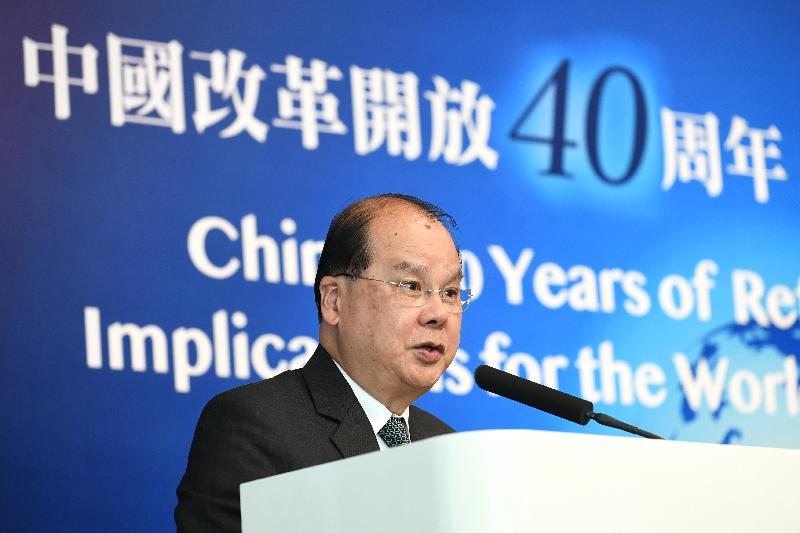Speech by CS at seminar on "China's 40 Years of Reform and Opening Up: Implications for the World and Role of Hong Kong" (English only) (with photo/video)
******************************************************************************************
Mr Dominique de Villepin (former Prime Minister of France), Mr Yukio Hatoyama (former Prime Minister of Japan), Mr Li Zhaoxing (Honorary President of the Chinese People's Institute of Foreign Affairs, former Minister of Foreign Affairs), Ms Charlene Barshefsky (former United States Trade Representative), Commissioner Xie (Commissioner of the Ministry of Foreign Affairs of the People's Republic of China in the Hong Kong Special Administrative Region, Mr Xie Feng), Dr Ronnie Chan (Chairman of the Executive Committee of the Better Hong Kong Foundation), Professor Lawrence Lau (former Vice-Chancellor and President, Chinese University of Hong Kong), distinguished speakers and guests from overseas, ladies and gentlemen,
Good afternoon. In early 1978, the then Chinese Vice-Premier Gu Mu led a delegation to France and other Western European countries to understand the economic structure and development of Europe. At that time, Beijing's international airport could manage the landing and takeoff of two planes per hour, whereas at Charles de Gaulle Airport of Paris, 60 flights took off and landed in an hour. Understandably, the Chinese delegation was spellbound.
In December of 1978, the Central People's Government made an important step and pushed through multiple economic reforms, opening up China to the world. History was made thereafter.
We began to witness an unprecedented growth in the Chinese economy, and how it swiftly and effectively raised the living standards of its vast population. The world watched in awe as Mainland China created countless economic miracles and gradually increased its influence on global issues. This transformation has changed the way that the world does business. China not only exported consumption goods such as sweaters, water bottles, mobile phones, but also technology and ideas. From 1979 to 2017, China's average economic growth stood at 9.5 per cent, significantly higher than the 2.9 per cent global average.
In 2001, China became a member of the World Trade Organization (WTO), completing the last leg of the country's journey of integration into the world economy. WTO membership has opened up China's market for more international trade and investment, as well as opening up the world economy for China's exports. "Made in China" became a household brand, drastically changing consumer habits in every corner of the world.
In the wake of the country's reform and opening up, Hong Kong's labour-intensive production processes were relocated north to the Mainland. Hong Kong's geographic proximity to the Mainland has allowed easy access to the huge market and the vast population in the Mainland. Businessmen from Hong Kong equipped with capital, international trading networks and management expertise started from Shenzhen, and then slowly built up a sophisticated manufacturing network in Dongguan and other cities in Guangdong, shipping all their products to the world. Success stories of Hong Kong enterprises quickly caught the world's attention, and encouraged many multinational companies to invest in China.
Hong Kong does not only contribute to the economy of China, but has also benefited substantially in many ways. At the dawn of the reform and opening up, as factories were moved to the Mainland, Hong Kong began to transform itself into a service economy, becoming an international finance, trading and maritime centre.
When we look back at the past four decades, there is absolutely no doubt that China's reform and opening up has brought prosperity and stability to the country, as well as important changes to the economic and social landscape of Hong Kong. Hong Kong has grown from an economy focusing on light industries such as textiles and clothing, toys, watches and more to become an international financial, trading and transportation hub. Indeed, the Washington-based Heritage Foundation has rated Hong Kong the world's freest economy for 24 years in a row.
As an externally oriented, open and vibrant economy with a robust legal system and the rule of law; as an international financial, business, professional services, logistics and maritime centre; and as a safe and welcoming metropolis with world-class infrastructure where East blends harmoniously with West, Hong Kong is strategically placed and, indeed, destined to play a crucial role as the super-connector, super-facilitator and super-promoter between China and the world as our country continues to open up to the rest of the world.
To contribute towards the country's comprehensive reform, Hong Kong will strengthen its co-operation with the Mainland. Travelling to the Mainland cities is now much faster than ever. The Hong Kong section of the Guangzhou-Shenzhen-Hong Kong Express Rail Link came on stream last month (September). The Hong Kong-Zhuhai-Macao Bridge has just commenced service. The Liantang/Heung Yuen Wai border crossing is expected to come into operation in the first half of next year and will further improve connectivity to the eastern part of the Pearl River Delta.
Leveraging on our capability in scientific and technological research with four of our universities amongst the world top 100, and our institutional strengths and unique advantages under "one country, two systems", Hong Kong is well placed to contribute to the national strategy of developing the Guangdong-Hong Kong-Macao Greater Bay Area into an international innovation and technology hub.
As we celebrate this important occasion, an occasion for the 40th anniversary, let me reassure our international and local audience today that Hong Kong will continue to contribute to the reform and opening up of the motherland by playing a key and constructive role for the long-term development and prosperity of the country.
So I am cutting my story short so that we can have more time for panel discussion. Thank you very much indeed.
Ends/Monday, October 29, 2018
Issued at HKT 15:45
Issued at HKT 15:45
NNNN
Photo
Audio / Video
CS attends seminar on "China's 40 Years of Reform and Opening Up: Implications for the World and Role of Hong Kong"



